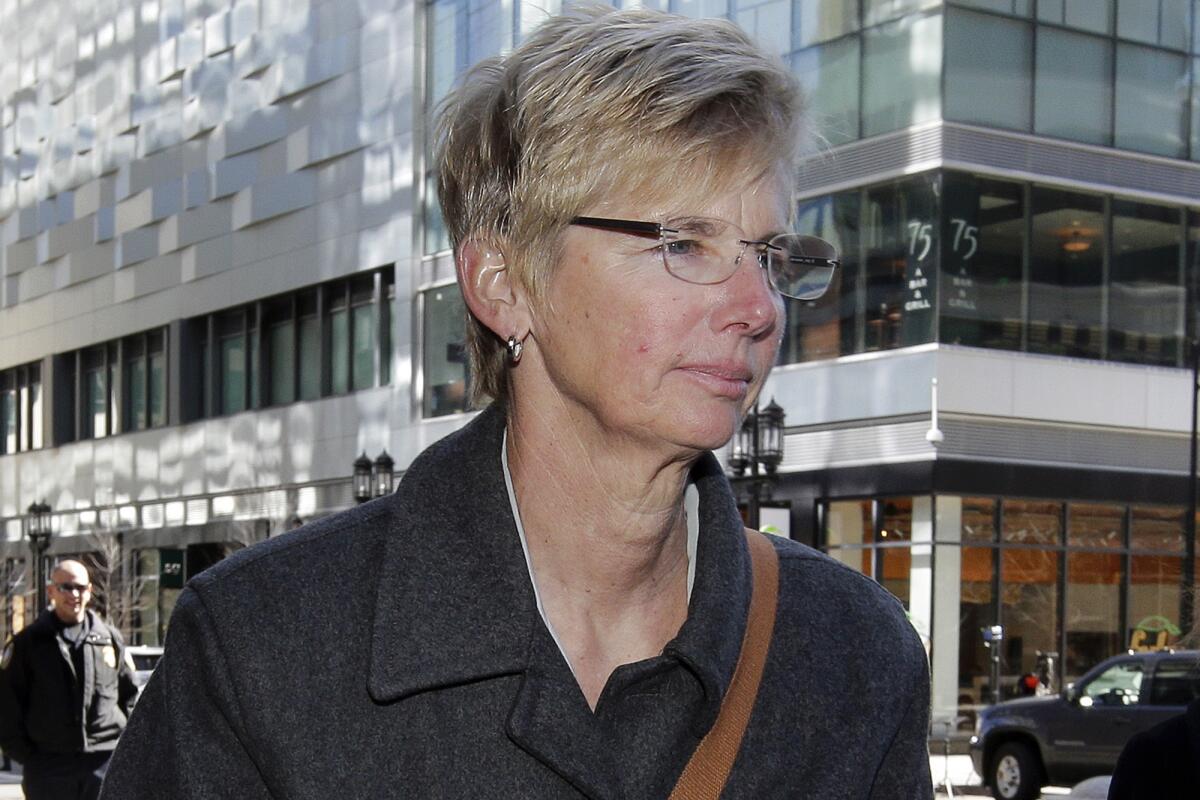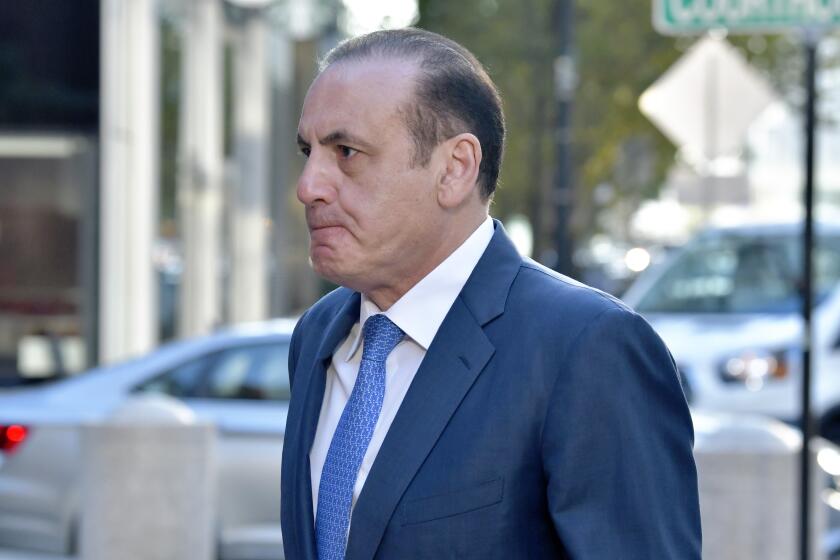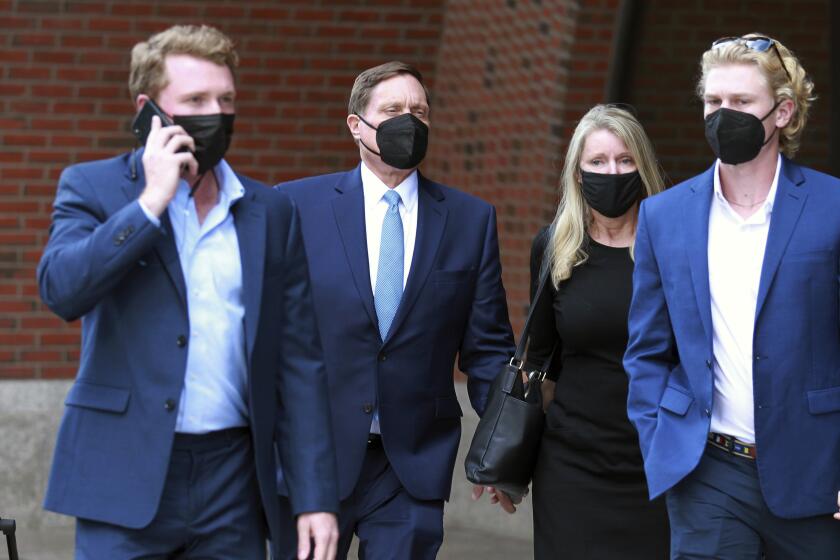Former USC athletics official pleads guilty in college admissions scandal

- Share via
Donna Heinel, a former athletics department official at USC, pleaded guilty on Friday in the college admissions bribery scandal, admitting she helped get students into the school by passing them off as elite athletes.
At a court hearing held remotely Friday, federal prosecutors in Boston told U.S. District Judge Indira Talwani they would seek a prison sentence of between three and four years. As part of the plea deal she made with prosecutors, Heinel will forfeit nearly $300,000 she received as part of the admission scam, court records show.
Heinel’s decision to plead guilty to a fraud charge and forgo a trial marks a significant victory for the U.S. attorney’s office in Massachusetts, which upended the elite ranks of higher education in 2019 when it unveiled a sprawling investigation dubbed Operation Varsity Blues. Dozens of wealthy parents, university coaches and others were charged in the case for allegedly working with the scheme’s admitted mastermind, William “Rick” Singer, to sneak undeserving kids into USC and other top schools.
Of the 57 people charged, Heinel was one of a remaining few who had maintained their innocence. Prosecutors portrayed Heinel, 60, as playing a crucial role in Singer’s operation. As a liaison between USC’s admissions office and the school’s vaunted athletics department, she was accused of hoodwinking admissions officials about children of Singer’s clients by presenting them as top-level athletes the school’s coaches wanted on their teams.
Two wealthy parents have been convicted of buying their kids’ way into school as athletic recruits in the first case to go to trial in the college admissions cheating scandal.
In one example cited in the indictment against Heinel and others, in 2015 she asked others involved in the scam for a “more athletic” photo of a boy that she used to help convince admissions officers that the teen was a football player, even though he did not play the sport. In other case, Heinel changed a student’s height on paperwork to make him appear taller, a prosecutor said Friday.
Among the many students Heinel is accused of pushing through the admissions process was a daughter of actress Lori Loughlin and designer Mossimo Giannulli. Prosecutors alleged in the case that in 2016 Heinel presented the girl to a USC admissions committee as a talented coxswain being recruited by the school’s rowing coach, which was not true. The girl was admitted “based on falsified athletic credentials,” prosecutors alleged.
Loughlin and Giannulli pleaded guilty and have served time in prison. Singer, who has pleaded guilty to several felonies and cooperated with investigators, is awaiting sentencing.
In exchange, Heinel, a senior associate athletic director who was the only high-ranking USC official to be charged in the case, was accused of receiving more than $1.3 million in payments. She was fired in March 2019.
The first trial began with defense attorneys seeking to portray the two parents accused of buying their kids way into school as victims of con man who believed their payments were legitimate donations.
At the remote hearing Friday, Heinel initially balked at admitting her role in the scam under questioning from Talwani.
Talwani asked Heinel if the student files she presented to admissions officers were fabricated to make it appear that USC coaches were recruiting the children of Singer’s clients for their teams.
“She takes these profiles and as the information … and makes these athletes look like better athletes,” said Nina Marino, Heinel’s attorney. “Makes it appear that the coaches are saying, ‘These are athletes we want on the team.’”
Heinel hedged when Talwani asked her if Marino’s description was accurate.
“I added information to these profiles to put them into a format that was a standardized kind of template format, which we presented,” Heinel said. “When I received that information and had found out that was fake information, so I …. ”
Federal prosecutors accused top CEOs, two Hollywood actresses and others of taking part in an audacious scheme to get their children into elite universities through fraud, bribes and lies.
Marino cut off her client and, after a short break, Heinel returned to the call and simply acknowledged her attorney’s description had been accurate.
Before accepting Heinel’s plea, Talwani also pressed prosecutors to explain how Heinel had personally benefitted, since parents typically made payments into a bank account managed by the USC athletics department. Prosecutors argued that Heinel received a professional gain from the payments, because she could decide how to dole out the money in the account.
“This is a source of funds she can use for her own office to develop her career to advance herself at USC,” said Assistant U.S. Atty. Kriss Basil.
Basil recounted a phone call between Singer and Heinel that federal agents recorded as part of their investigation. In it, Heinel and Singer discussed $50,000 payments Singer’s clients would make to the USC account. Following the call, Heinel sent an invoice to Singer and at least one payment went to a consulting business Heinel owned, Basil said in court.
Until recently, Marino was still aggressively fighting the case against Heinel. In August, she sought unsuccessfully to have several charges against Heinel thrown out, saying prosecutors had added them as part of an orchestrated plan to punish Heinel for refusing to plead guilty.
Following the hearing, Marino said Heinel had done the “honorable thing” by pleading guilty. She criticized the charges the government pursued against Heinel, saying the case “was wildly overcharged in the first place.”
Heinel’s guilty plea comes less than a month before her case was set to go to trial. If convicted, she would have faced many years in prison. Her sentencing is set for March next year.
More to Read
Sign up for Essential California
The most important California stories and recommendations in your inbox every morning.
You may occasionally receive promotional content from the Los Angeles Times.

















